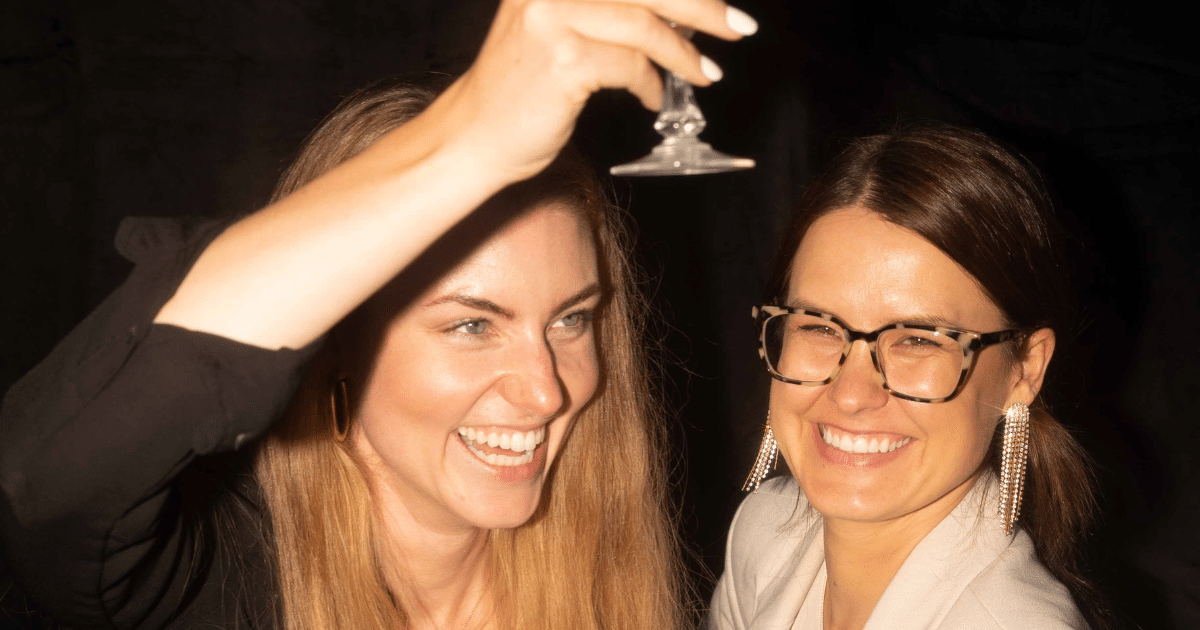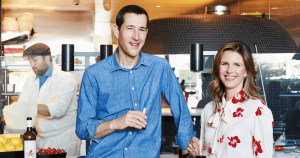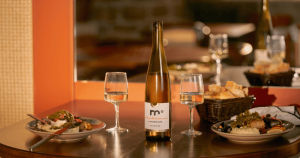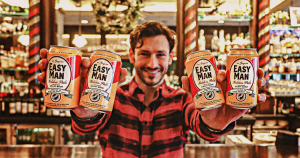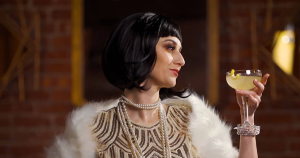For this week’s issue of High Spirits, Tilden co-founders Vanessa Royle and Mariah Hilton Wood explain the inspiration behind their brand. Plus, they outline why they think craft beverages are the future of non-alc.
DA: How have your personal experiences influenced the mission of Tilden?
Vanessa: I quit drinking in May 2020 after years of relying on alcohol for nearly every social and celebratory occasion in my life. Three months after getting sober, I moved from California to Boston to start business school. Being in a new environment with new people trying to make connections, network, and form friendships—all without the crutch of alcohol—was intimidating. It was during those first few months of sobriety that I realized how ubiquitous alcohol had become in my day to day life. The early seedlings of Tilden were inspired by some of my frustrations during early sobriety. I wanted adult beverages—without the alcohol—that matched the occasions I was attending, and I wanted to feel comfortable in my skin. When I met Mariah halfway through our first year of school, I was inspired by her love for hosting, mixology, and making the most of every moment. Here was someone who had never needed alcohol to have fun and was simply herself in every situation. Together, we’ve built a brand that has made us feel more included in social situations and has welcomed others into the conversation.
Mariah: I studied for my first year of college at the University of Las Vegas Nevada (UNLV), just a couple blocks from the Vegas Strip. After my freshman year, I transferred to Brigham Young University (BYU) in Provo, Utah, a campus known as stone cold sober. It was a stark contrast. Believe me or don’t, but it turns out the sober kids had more fun. Why? Alcohol wasn’t an activity placeholder, they had to be creative and purposeful about gathering, and there was no substitute for learning to be themselves in social settings. After college, I took a job in management consulting. I was often the only woman in the room, but even more often the only non-drinker at client dinners. After years in a basically booze-free environment, I was surprised at how expected drinking was and how uncomfortable some folks became when I casually turned down a drink. I’m very open about my choices, but I learned that drinking habits aren’t always the best conversation topic to build early rapport, and I became eager for drink options that didn’t force the subject. I’ve always been an experience junkie and I don’t watch from the sidelines. I want to be on the dance floor, taste test all the appetizers, try out that weird hobby, and jump in the water. So, naturally, being left out of the cocktail conversation and foodie experience of sophisticated drinks makes me moody. For over a decade I’ve mixed my own substitutes, had signature mocktails at my parties, and tried any remotely interesting NA options on the market. All this in a search for a more inspiring drinking experience. All these elements come together in my personal connection to the non-alc movement and Tilden’s mission. I find the expectation that alcohol improves social experience to be a false norm, and encourage folks to test the theory. I also believe opting out of alcohol shouldn’t also necessitate opting out of social settings, flavor exploration, or the elevated experience of holding a thoughtfully crafted adult cocktail in hand.
DA: Vanessa, you’ve shared that you didn’t drink at your wedding. How does Tilden aim to support those who choose to celebrate their special moments without alcohol?
Vanessa: Weddings are a time for people to let loose, so I originally didn’t know how I’d approach one of the bigger celebrations of my life. Having my own brand made it so special—and easy!—to celebrate my wedding day without drinking. We served an early prototype of Tilden in lieu of a champagne toast but also had signature cocktails available for those who wanted to drink. Tilden has always been about creating spirited connections and including everyone in the cocktail conversation, whether they drink or not. We created Tilden for shareable moments. Celebratory occasions like weddings, engagements, grad parties, house warmings, etc. all deserve to have great NA options to match their traditional counterparts.
DA: How does Tilden differentiate itself from other non-alcoholic beverage brands on the market?
Vanessa: Our mission is to inspire deep and authentic connection through our unique, non-alcoholic cocktails free of mind- or body-altering ingredients. No added sugars, adaptogens, or preservatives. Excluding preservatives was a no-brainer, but we were keen to make a non-adaptogenic drink despite functional ingredients being all the rage. Mariah and I are very passionate about rituals and social gatherings, and we want people to feel confident socializing and celebrating without a buzz of any kind. We also know that many people (including myself) take medications that don’t mix well with certain functional ingredients, and pregnant and nursing mothers are often advised to steer clear. On the flavor front, we created unique concoctions that don’t directly replicate existing alcohols or well-known cocktails. I have friends who feel triggered at times when drinking NA beers or spirit alternatives, so it was important to me that our cocktails stand on their own. Finally, our cocktails are very low in sugar. When I quit drinking, I immediately realized that a huge part of my hangovers had been the sugar content. I didn’t want my NA cocktail to give people sugar hangovers, so we’ve purposefully limited our cocktails to one gram of sugar or less per serving. Ultimately, we wanted to create adult beverages that can be enjoyed by everyone.
DA: How do you ensure that Tilden’s beverages cater to a variety of tastes and preferences? Or are you focused on appealing to a particular kind of palate?
Mariah: We are trying to serve a customer who’s looking for a sophisticated adult drink experience—something with depth and not overly sweet. During early testing, we tried dozens and dozens of flavor directions in focus groups to get a sense for our customers’ various tastes. We found three primary profiles that people seek: herbaceous, savory, and fruity. We decided to start by delivering on these three major pillars before introducing other novel directions. Of course, within each of those flavor families, there is a lot of room for creative direction. As we developed, we sought out both expert and novice opinions on prototypes. Since launching in February, we’ve sold out twice and won several awards, including Gold at the World Alcohol Free Awards, and Best In Show at the L.A. Spirits Awards, so our first flavor expressions are clearly resonating!
DA: What is your favorite way to enjoy Tilden?
Vanessa: I’m a big proponent of simplicity, so I prefer Tilden over a cube of clear ice and with an easy garnish of sliced cucumber (Lacewing) or an orange wedge (Tandem). To make things a bit fancier, I’ll make a cucumber ribbon or an orange twist, add a splash of soda water on top. When it gets cooler out, I plan to serve Tandem warmed with a bit of cinnamon and clove… it gives NA hot toddy vibes.
DA: How do you approach innovation at Tilden? Are there any new products in the pipeline?
Mariah: We’re exploring new product innovation across different use cases and flavor expressions. We have a new bottle size in the works right now for use in mini bars and for more solo drinking occasions. We also can’t wait to introduce new flavors—and yes we do have a new expression in the works! Going back to the three primary flavor pillars in our development, there’s one we haven’t hit yet!
DA: Can you share any interesting experiences you’ve had while building Tilden?
Vanessa: Entrepreneurship is a roller coaster, plain and simple. There are high highs and low lows, and the goal is just to stay on the ride and forge ahead. In the first six months of Tilden, I pitched Kevin O’Leary (Mr. Wonderful from Shark Tank) during one of my classes at Harvard Business School. He didn’t like my idea and actually called me a cockroach (avid watchers of Shark Tank will understand this common refrain) in front of my classmates. I was embarrassed, frustrated, and quite frankly, a little miffed. This early rejection set the stage for many to come and taught me about the resilience that’s required to live the life of an entrepreneur. My work life is a roller coaster, and it’s really about how you react to the failures, the rejection, and the naysayers that can make or break your journey. The morning after my baby Shark Tank pitch, I woke up feeling eager to prove the naysayers wrong, and it’s this drive and conviction that keeps me going. (That, and the thought of one day appearing on the real Shark Tank and showing Kevin all that we’ve built).
DA: What advice would you give to someone who is thinking about starting their own non-alc beverage company?
Vanessa: Know why you’re doing it. Mariah and I have a very close relationship with our brand, because we created it for ourselves! When you yourself are the target market, sales and marketing become a lot easier. On tough days, being mission-driven helps drive us forward. Overall, the NA community is so positive and its founders so helpful and welcoming. It’s very much a “rising tides lift all ships” mentality, and we all want to see each other succeed… more NA brands means more NA options for everyone!
DA: What do you think is in store for the non-alc industry over the next decade?
Mariah: In the past, “craft beverages” was a category reserved for alcoholic drinks. That is changing, and as the care and intention behind elevated non-alcoholic drinks gains recognition, I expect the booze-free shelf at the bar to expand in breadth along with the number of options on a single menu. Lifelong sober curious customers like those from Gen Z, whether fully sober or flexi-drinkers, are less familiar with alcohol equivalents and more likely to reach for something unique. I see the NA category moving away from imitations of alcoholic beverages and spirits as it establishes its own merits and as the consumer evolves.
___
Dry Atlas is your guide to the world of alcohol alternatives. We maintain the world’s largest directory of non-alcoholic spirits, wines, beers, and more to help you discover options you’ll love. We also publish High Spirits, the weekly newsletter that helps open-minded drinkers like you learn more about non-alc. Our goal is to demystify alcohol alternatives so you can navigate them with ease to pursue a happier, healthier life.


